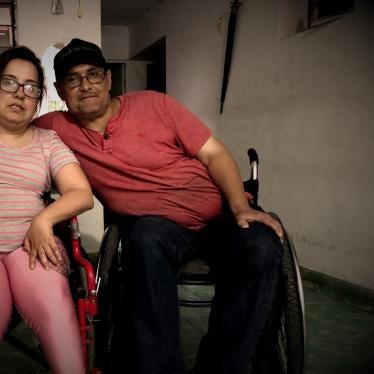(Mexico City, October 17, 2017) – Mexico’s Congressional Mental Health and Drug Commission is considering a national mental health bill that proposes to improve mental health services for all in Mexico but would seriously jeopardize the rights of people with disabilities, Human Rights Watch said today.
In a letter sent on October 16, 2017, to the Commission on Health and Drugs in the Chamber of Deputies, Human Rights Watch urged the commission to reject the bill in its current form. The commission should revise the bill to reflect a human rights-oriented framework, based on consultations with organizations representing people with disabilities and disability rights experts. The final bill should ensure the right to mental health for all in Mexico on an equal basis, without resort to forced treatment, and be consistent with Mexico’s laudable international commitments to the rights of persons with disabilities.
“The bill before the commission unfortunately reflects a discredited approach to mental health, focusing on forced medical treatment instead of on the consent, autonomy, and rights of those in need of mental health services,” said Carlos Ríos Espinosa, senior researcher and advocate for disability rights at Human Rights Watch. “The bill is inconsistent with Mexico’s human rights obligations, in particular the right to consent to or refuse treatment, which is an integral aspect of the right to health.”
Mexico was an early champion of the United Nations Convention on the Rights of Persons with Disabilities (CRPD), signing the treaty when it was first opened and becoming a full party to the CRPD in 2007. The Mexican government has the opportunity with this new law to incorporate the standards of the CRPD into domestic law and protect the rights of persons with disabilities. It should follow the example of other countries and international organizations, such as the World Health Organization, that are developing new mental health policies that respect the rights of people with disabilities and emphasize people’s right to choose and to govern their own lives. In particular, it should act on the recommendations to it from the CRPD Committee to:
- Eliminate security measures that mandate medical and psychiatric inpatient treatment and promote alternatives that comply with articles 14 and 19 of the Convention;
- Repeal legislation permitting detention on grounds of disability and ensure that all mental health services are provided based on the free and informed consent of the person concerned.
The current bill would still allow people to be locked up against their will on the basis that they had a diagnosed disability, Human Rights Watch said But UN experts on health and torture and the UN expert body on disability rights have emphasized that forced treatment and other nonconsensual invasive measures, including involuntary admission to psychiatric hospitals for medical treatment, should be ended.
The bill would provide broad authority for medical and judicial authorities to find that people labeled as having “mental disorders” do not have the capacity to make decisions for themselves. In such circumstances, the bill authorizes involuntary hospitalization and treatment without the person’s consent. Under human rights norms, people with disabilities may not be detained on the basis of their disability, and may only be detained, on an equal basis with others, if they engage in behavior that constitutes grounds for detention for everyone under the law.
Among other worrisome elements, the bill allows the solitary confinement of and use of physical restraints on people with “mental disorders,” which experts agree can constitute torture or cruel, inhuman, or degrading treatment.
“It is commendable that the commission is devoting time and effort to enhance the right to health for all Mexicans, but it’s all the more important for them to get it right,” Rios Espinosa said. “The commission should create a framework for health services that respects the right to informed consent, whether you have a disability or not.”





